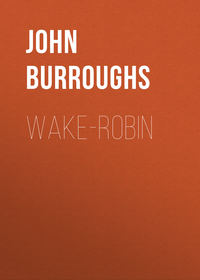 полная версия
полная версияWhitman: A Study
Whitman is seldom or never the poet of a sentiment, at least of the domestic and social sentiments. His is more the voice of the eternal, abysmal man.
The home, the fireside, the domestic allurements, are not in him; love, as we find it in other poets, is not in him; the idyllic, except in touches here and there, is not in him; the choice, the finished, the perfumed, the romantic, the charm of art and the delight of form, are not to be looked for in his pages. The cosmic takes the place of the idyllic; the begetter, the Adamic man, takes the place of the lover; patriotism takes the place of family affection; charity takes the place of piety; love of kind is more than love of neighbor; the poet and the artist are swallowed up in the seer and the prophet.
The poet evidently aimed to put in his sex poems a rank and healthful animality, and to make them as frank as the shedding of pollen by the trees, strong even to the point of offense. He could not make it pleasing, a sweet morsel to be rolled under the tongue; that would have been levity and sin, as in Byron and the other poets. It must be direct and rank, healthfully so. The courage that did it, and showed no wavering or self-consciousness, was more than human. Man is a begetter. How shall a poet in our day and land treat this fact? With levity and by throwing over it the lure of the forbidden, the attraction of the erotic? That is one way, the way of nearly all the poets of the past. But that is not Whitman's way. He would sooner be bestial than Byronic, he would sooner shock by his frankness than inflame by his suggestion. And this in the interest of health and longevity, not in the interest of a prurient and effeminate "art." In these poems Whitman for a moment emphasizes sex, the need of sex, and the power of sex. "All were lacking if sex were lacking." He says to men and women, Here is where you live after all, here is the seat of empire. You are at the top of your condition when you are fullest and sanest there. Fearful consequences follow any corrupting or abusing or perverting of sex. The poet stands in the garden of the world naked and not ashamed. It is a great comfort that he could do it in this age of hectic lust and Swinburnian impotence, – that he could do it and not be ridiculous. To have done it without offense would have been proof that he had failed utterly. Let us be shocked; it is a wholesome shock, like the douse of the sea, or the buffet of the wind. We shall be all the better for it by and by.
XIVThe lover of Whitman comes inevitably to associate him with character and personal qualities. I sometimes meet women whom I say are of the Whitman type – the kind of woman he invoked and predicted. They bear children, and are not ashamed; motherhood is their pride and their joy: they are cheerful, tolerant, friendly, think no evil, meet high and low on equal terms; they walk, row, climb mountains; they reach forth into the actual world of questions and events, open-minded, sympathetic, frank, natural, good-natured; the mates and companions of their husbands, keeping pace with them in all matters; home-makers, but larger than home, considerate, forgiving, unceremonious, – in short, the large, fresh, wholesome open-air natures whose ideal so completely possessed Walt Whitman.
A British critic wisely says the gift of Whitman to us is the gift of life rather than of literature, but it is the gift of life through literature. Indeed, Whitman means a life as much as Christianity means a life. He says: —
"Writing and talk do not prove me."Nothing but the test of reality finally proves him: —
"The proof of the poet shall be sternly deferr'd till his country has absorbed him as affectionately as he has absorbed it."The proof of Whitman shall be deferred till he has borne fruit in actual, concrete life.
He knew that merely intellectual and artistic tests did not settle matters in his case, or that we would not reach his final value by making a dead-set at him through the purely æsthetic faculties. Is he animating to life itself? Can we absorb and assimilate him? Does he nourish the manly and heroic virtues? Does he make us more religious, more tolerant, more charitable, more candid, more self-reliant? If not, he fails of his chief end. It is doubtful if the purely scholarly and literary poets, like Milton, say, or like our own Poe, are ever absorbed in the sense above implied; while there is little doubt that poets like Homer, like Shakespeare, are absorbed and modify a people's manners and ideals. Only that which we love affects our lives. Our admiration for art and literature as such is something entirely outside the sources of character and power of action.
Whitman identifies himself with our lives. We associate him with reality, with days, scenes, persons, events. The youth who reads Poe or Lowell wants to be a scholar, a wit, a poet, a writer; the youth who reads Whitman wants to be a man, and to get at the meaning and value of life. Our author's bent towards real things, real men and women, and his power to feed and foster personality, are unmistakable.
Life, reality, alone proves him; a saner and more robust fatherhood and motherhood, more practical democracy, more charity, more love, more comradeship, more social equality, more robust ideals of womanly and manly character, prove him. When we are more tolerant and patient and long-suffering, when the strain of our worldly, commercial spirit relaxes, then is he justified. Whitman means a letting-up of the strain all along the line, – less hurry, less greed, less rivalry, more leisure, more charity, more fraternalism and altruism, more religion, less formality and convention.
"When America does what was promised,When each part is peopled with free people,When there is no city on earth to lead my city, the city of young men, the Mannahatta city – but when the Mannahatta leads all the cities of the earth,When there are plentiful athletic bards, inland and seaboard,When through these States walk a hundred millions of superb persons,When the rest part away for superb persons, and contribute to them,When fathers, firm, unconstrained, open-eyed – when breeds of the most perfect mothers denote America,Then to me ripeness and conclusion."XVAfter all I think it matters little whether we call him poet or not. Grant that he is not a poet in the usual or technical sense, but poet-prophet, or poet-seer, or all combined. He is a poet plus something else. It is when he is judged less than poet, or no poet at all, that we feel injustice is done him. Grant that his work is not art, that it does not give off the perfume, the atmosphere of the highly wrought artistic works like those of Tennyson, but of something quite different.
We have all been slow to see that his cherished ends were religious rather than literary; that, over and above all else, he was a great religious teacher and prophet. Had he been strictly a literary poet, like Lowell, or Longfellow, or Tennyson, – that is, a writer working for purely artistic effects, – we should be compelled to judge him quite differently.
"Leaves of Grass" is a gospel – glad tidings of great joy to those who are prepared to receive it. Its final value lies in its direct, intense, personal appeal; in what it did for Symonds, who said it made a man of him; in what it did for Stevenson, who said it dispelled a thousand illusions; in what it did for Mrs. Gilchrist, who said it enabled her to find her own soul; in what it does for all earnest readers of it in blending with the inmost current of their lives. Whitman is the life-giver of our time. How shall a poet give us life but by making us share his larger measure of life, his larger hope, his larger love, his larger charity, his saner and wider outlook? What are the three great life-giving principles? Can we name them better than St. Paul named them eighteen hundred years ago, – faith, hope, charity? And these are the cornerstones of Whitman's work, – a faith so broad and fervent that it accepts death as joyously as life, and sees all things at last issue in spiritual results; a hope that sees the golden age ahead of us, not behind us; and a charity that balks at nothing, that makes him identify himself with offenders and outlaws; a charity as great as his who said to the thief on the cross, "This day thou shalt be with me in paradise."
To cry up faith, hope, and charity is not to make men partakers of them; but to exemplify them in a survey of the whole problem of life, to make them vital as hearing, or eyesight in a work of the imagination, to show them as motives and impulses controlling all the rest, is to beget and foster them in the mind of the beholder.
He is more and he is less than the best of the other poets. The popular, the conventional poets are mainly occupied with the artistic side of things, – with that which refines, solaces, beautifies. Whitman is mainly occupied with the cosmic and universal side of things, and the human and spiritual values that may be extracted from them. His poetry is not the result of the same kind of selection and partiality as that we are more familiar with.
Hence, while the message of Tennyson and his kind is the message of beauty, the message of Whitman is, in a much fuller sense, the message of life. He speaks the word of faith and power. This is his distinction; he is the life-giver. Such a man comes that we may have life, and have it more abundantly.
The message of beauty, – who would undervalue it? The least poet and poetling lisps some word or syllable of it. The masters build its temples and holy places. All own it, all receive it gladly. But the gospel of life, there is danger that we shall not know it when we hear it. It is a harsher and more heroic strain than the other. It calls no man to his ease, or to be lulled and soothed. It is a summons and a challenge. It lays rude, strong hands upon you. It filters and fibres your blood. It is more of the frost, the rains, the winds, than of cushions or parlors.
The call of life is a call to battle always. We are stronger by the strength of every obstacle or enemy overcome.
"Listen! I will be honest with you,I do not offer the old smooth prizes, but offer rough new prizes,These are the days that must happen to you:"You shall not heap up what is called riches,You shall scatter with lavish hand all that you earn or achieve;You but arrive at the city to which you were destined – you hardly settle yourself to satisfaction,before you are called by an irresistible call to depart.You shall be treated to the ironical smiles and mockings of those who remain behind you;What beckonings of love you receive, you shall only answer with passionate kisses of parting,You shall not allow the hold of those who spread their reached hands toward you."Allons! After the Great Companions! and to belong to them!"XVIWhitman always avails himself of the poet's privilege and magnifies himself. He magnifies others in the same ratio, he magnifies all things. "Magnifying and applying come I," he says, "outbidding at the start the old cautious hucksters." Indeed, the character which speaks throughout "Leaves of Grass" is raised to the highest degree of personal exaltation. To it nothing is trivial, nothing is mean; all is good, all is divine. The usual distinctions disappear, burned up, the poet says, for religion's sake. All the human attributes are heightened and enlarged; sympathy as wide as the world; love that balks at nothing; charity as embracing as the sky; egotism like the force of gravity; religious fervor that consumes the coarsest facts like stubble; spirituality that finds God everywhere every hour of the day; faith that welcomes death as cheerfully as life; comradeship that would weld the nation into a family of brothers; sexuality that makes prudes shudder; poetic enthusiasm that scornfully dispenses with all the usual adventitious aids; and in general a largeness, coarseness, and vehemence that are quite appalling to the general reader. Lovers of poetry will of necessity be very slow in adjusting their notions to the standards of "Leaves of Grass." It is a survey of life and of the world from the cosmic rather than from the conventional standpoint. It carries the standards of the natural-universal into all fields.
Some men have accepted poverty and privation with such contentment and composure as to make us almost envious of their lot; and Whitman accepts the coarser, commoner human elements which he finds in himself, and which most of us try to conceal or belittle, with such frankness and perception of their real worth that they acquire new meaning and value in our eyes. If he paraded these things unduly, and showed an overweening preference for them, as some of his critics charge, this is of course an element of weakness.
His precept and his illustration, carried out in life, would fill the land with strong, native, original types of men and women animated by the most vehement comradeship, selfism and otherism going hand in hand.
HIS RELATION TO CULTURE
I"Leaves of Grass" is not the poetry of culture, but it is to be said in the same breath that it is not such a work as an uncultured man produces, or is capable of producing.
The uncultured man does not think Whitman's thoughts, or propose Whitman's problems to himself, or understand or appreciate them at all. The "Leaves" are perhaps of supreme interest only to men of deepest culture, because they contain in such ample measure that without which all culture is mere varnish or veneer. They are indirectly a tremendous criticism of American life and civilization, and they imply that breadth of view and that liberation of spirit – that complete disillusioning – which is the best result of culture, and which all great souls have reached, no matter who or what their schoolmasters may have been.
Our reading public probably does not and cannot see itself in Whitman at all. He must be a great shock to its sense of the genteel and the respectable. Nor can the working people and the unlettered, though they were drawn to Whitman the man, be expected to respond to any considerable extent to Whitman the poet. His standpoint can be reached only after passing through many things and freeing one's self from many illusions. He is more representative of the time-spirit out of which America grew, and which is now shaping the destiny of the race upon this continent. He strikes under and through our whole civilization.
He despised our social gods, he distrusted our book-culture, he was alarmed at the tendency to the depletion and attenuation of the national type, and he aimed to sow broadcast the germs of more manly ideals. His purpose was to launch his criticism from the basic facts of human life, psychic and physiologic; to inject into the veins of our anæmic literature the reddest, healthiest kind of blood; and in doing so he has given free swing to the primary human traits and affections and to sexuality, and has charged his pages with the spirit of real things, real life.
We have been so long used to verse which is the outcome of the literary impulse alone, which is written at so many removes from the primary human qualities, produced from the extreme verge of culture and artificial refinement, which is so innocent of the raciness and healthful coarseness of nature, that poetry which has these qualities, which implies the body as well as the mind, which is the direct outgrowth of a radical human personality, and which make demands like those made by real things, is either an offense to us or is misunderstood.
IIWhitman says his book is not a good lesson, but it takes down the bars to a good lesson, and that to another, and that to another still. To take down bars rather than to put them up is always Whitman's aim; to make his reader free of the universe, to turn him forth into the fresh and inexhaustible pastures of time, space, eternity, and with a smart slap upon his back with the halter as a spur and send-off, is about what he would do. His message, first and last, is "give play to yourself;" "let yourself go;" – happiness is in the quest of happiness; power comes to him who power uses.
"Long enough have you timidly waded, holding a plank by the shore;Now I will you to be a bold swimmer,To jump off in the midst of the sea, rise again, nod to me, shout, and laughingly dash with your hair."To hold Whitman up to ridicule, and to convict him of grossness and tediousness, is easy enough; first, because he is so out of relation to the modes and taste of his times, and, secondly, because he has somewhat of the uncouthness and coarseness of large bodies. Then his seriousness and simplicity, like that of Biblical and Oriental writers, – a kind of childish inaptness and homeliness, – often exposes him to our keen, almost abnormal sense of the ridiculous. He was deficient in humor, and he wrote his book in entire obliviousness of social usages and conventions, so that the perspective of it is not the social or indoor perspective, but that of life and nature at large, careering and unhampered. It is probably the one modern poem whose standards are not social and what are called artistic.
Its atmosphere is always that of the large, free spaces of vast, unhoused nature. It has been said that the modern world could be reconstructed from "Leaves of Grass," so compendious and all-inclusive is it in its details; but of the modern world as a social organization, of man as the creature of social usages and prohibitions, of fashions, of dress, of ceremony, – the indoor, parlor and drawing-room man, – there is no hint in its pages. In its matter and in its spirit, in its standards and in its execution, in its ideals and in its processes, it belongs to and affiliates with open-air nature, often reaching, I think, the cosmic and unconditioned. In a new sense is Whitman the brother of the orbs and cosmic processes, "conveying a sentiment and invitation of the earth." All his enthusiasms, all his sympathies have to do with the major and fundamental elements of life. He is a world-poet. We do not readily adjust our indoor notions to him. Our culture-standards do not fit him.
IIIThe problem of the poet is doubtless more difficult in our day than in any past day; it is harder for him to touch reality.
The accumulations of our civilization are enormous: an artificial world of great depth and potency overlies the world of reality; especially does it overlie the world of man's moral and intellectual nature. Most of us live and thrive in this artificial world, and never know but it is the world of God's own creating. Only now and then a man strikes his roots down through this made land into fresh, virgin soil. When the religious genius strikes his roots through it, and insists upon a present revelation, we are apt to cry "heretic;" when the poet strikes his roots through it, as Whitman did, and insists upon giving us reality, – giving us himself before custom or law, – we cry "barbarian," or "art-heretic," or "outlaw of art."
In the countless adjustments and accumulations, and in the oceanic currents of our day and land, the individual is more and more lost sight of, – merged, swamped, effaced. See him in Whitman rising above it all. See it all shot through and through with his quality and obedient to his will. See the all-leveling tendency of democracy, the effacing and sterilizing power of a mechanical and industrial age, set at naught or reversed by a single towering personality. See America, its people, their doings, their types, their good and evil traits, all bodied forth in one composite character, and this character justifying itself and fronting the universe with the old joy and contentment.
IV"The friendly and flowing savage, who is he?Is he waiting for civilization, or is he past it and master of it?"Do we not, consciously or unconsciously, ask this or a similar question of every poet or artist whom we pass in review before us? Is he master of his culture, or does it master him? Does he strike back through it to simple, original nature, or is he a potted plant? Does he retain the native savage virtues, or is he entirely built up from the outside? We constantly mistake culture for mere refinement, which it is not: it is a liberating process; it is a clearing away of obstructions, and the giving to inherent virtues a chance to express themselves. It makes savage nature friendly and considerate. The aim of culture is not to get rid of nature, but to utilize nature. The great poet is always a "friendly and flowing savage," the master and never the slave of the complex elements of our artificial lives.
Though our progress and civilization are a triumph over nature, yet in an important sense we never get away from nature or improve upon her. Her standards are still our standards, her sweetness and excellence are still our aim. Her health, her fertility, her wholeness, her freshness, her innocence, her evolution, we would fain copy or reproduce. We would, if we could, keep the pungency and aroma of her wild fruit in our cultivated specimens, the virtue and hardiness of the savage in our fine gentlemen, the joy and spontaneity of her bird-songs in our poetry, the grace and beauty of her forms in our sculpture and carvings.
A poetic utterance from an original individual standpoint, something definite and characteristic, – this is always the crying need. What a fine talent has this or that young British or American poet whom we might name! But we see that the singer has not yet made this talent his own; it is a kind of borrowed capital; it is the general taste and intelligence that speak. When will he redeem all these promises, and become a fixed centre of thought and emotion in himself? To write poems is no distinction; to be a poem, to be a fixed point amid the seething chaos, a rock amid the currents, giving your own form and character to them, – that is something.
It matters little, as Whitman himself says, who contributes the mass of poetic verbiage upon which any given age feeds.
But for a national first-class poem, or a great work of the imagination of any sort, the man is everything, because such works finally rest upon primary human qualities and special individual traits. A richly endowed personality is always the main dependence in such cases, or, as Goethe says, "in the great work the great person is always present as the great factor."
"Leaves of Grass" is as distinctly an emanation from Walt Whitman, from his quality and equipment as a man apart from anything he owed to books or to secondary influences, as a tree is an emanation from the soil. It is, moreover, an emanation from him as an American in the latter half of the nineteenth century, and as a typical democratic composite man, a man of the common people, bone of their bone and flesh of their flesh, but with an extraordinary endowment of spiritual and intellectual power, to which he has given full swing without abating one jot or tittle the influence of his heritage of the common stock.
VThere is one important quality that enters into all first-class literary production and into all art, which is taken little account of in current criticism: I mean the quality of the manly, – the pulse and pressure of manly virility and strength. Goethe spoke of it to Eckermann as a certain urgent power in which the art of his time was lacking. The producers had taste and skill, but were not masterful as men. Goethe always looked straight through the work to the man behind it; in art and poetry the personality was everything. The special talent of one kind or another was quite secondary. The greatest works are the least literary. To speak in literature as a man, and not merely as a scholar or professional litterateur, is always the crying need. The new poet has this or that gift, but what is the human fund back of all? What is his endowment of the common universal human traits? How much of a man is he? His measure in this respect will be the measure of the final value of his contribution.
The decadence of literature sets in when there is more talent than character in current production; when rare literary and artistic gifts no longer come wedded to large human and manly gifts; when taste is fastidious rather than robust and hearty. When was there a man born to English or American literature with a large endowment of the universal human qualities, or with those elements that give breadth and power, and which lead art rather than follow it? We are living in an age of great purity and refinement of taste in art and letters, but destitute of power. Goethe spoke of Walter Scott not merely as a great talent, but as a "comprehensive nature." Without this comprehensive nature as a setting, his great talent would have amounted to but little. This gives the weight, the final authority. How little there was on the surface of Scott of the literary keenness, subtlety, knowingness of later producers, and yet how far his contribution surpasses theirs in real human pathos and suggestiveness!









